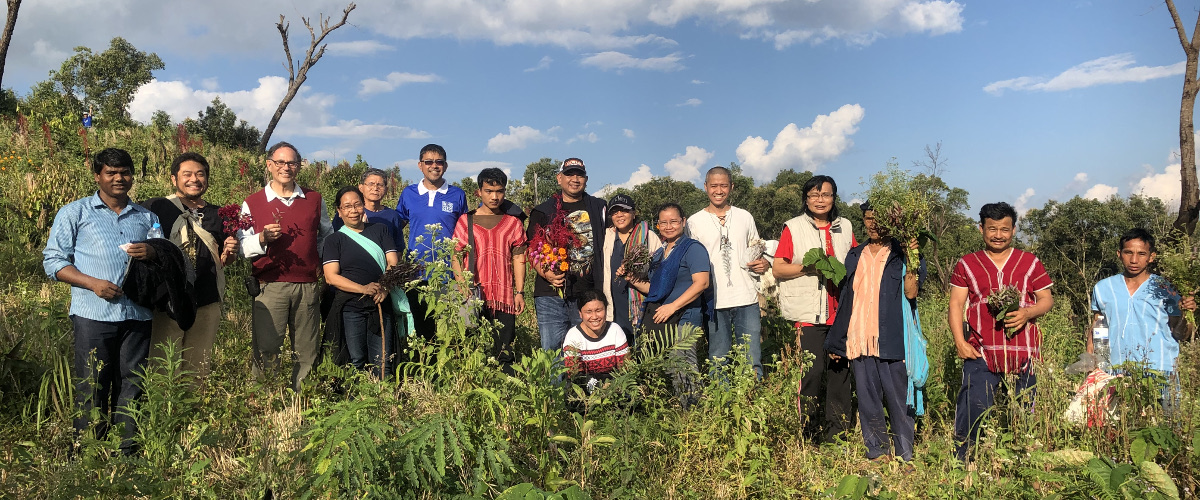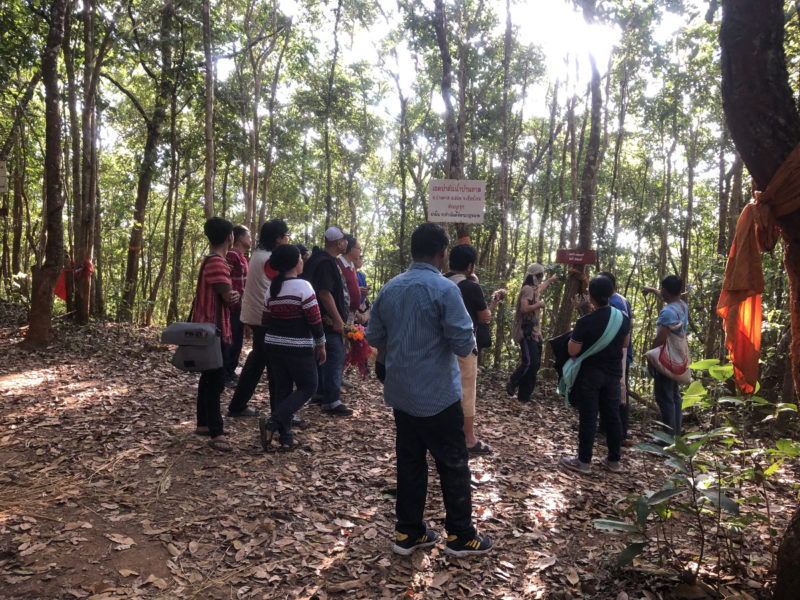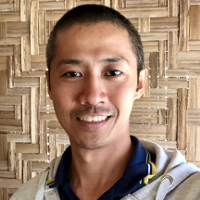 The gathering of the Jesuit Companions in Indigenous Ministry (JCIM) in Chiang Mai, Thailand from November 30 to December 5 enabled us who are working in the indigenous peoples (IP) apostolate in Asia Pacific to have a more in-depth experience and spiritual consolation in working as a network.
The gathering of the Jesuit Companions in Indigenous Ministry (JCIM) in Chiang Mai, Thailand from November 30 to December 5 enabled us who are working in the indigenous peoples (IP) apostolate in Asia Pacific to have a more in-depth experience and spiritual consolation in working as a network.
JCIM’s meetings happen every two years and in 2018 we focussed on “a sustainable livelihood with contemplative, prophetic lifestyle” (LS 218) of “less is more” (LS 222). We stayed within the compound of the Communal Life of Love and the Unity of Mountain People Foundation (CLUMP) in Doi Tong. Br Anurak Nidhibhadrabh, who has served as the “engineer” of CLUMP has been helping the Karen hill tribe leaders put up sustainable livelihood projects like coffee and cacao production. The group has received special recognition as a model of sustainable livelihood from both local and international institutions.
We visited the Karen hill tribe of Ban Pa Pae, one of the mountain tribes in Chiang Mai. Their village is located 1,462 metres above sea level in Lampung District, 35 kilometres from Doi Tong. There are 66 households which are a mix of Buddhists, Christians, Catholics and traditional believers.
One memorable part of our experience was a two-kilometre trail traversing the mountainside. We saw how they cared for and protected their forestlands from the threat of encroachers. We saw first-hand their traditional rotational upland farming, a proven method of sustaining the life cycle of the forest. It contradicts the widespread misinformation that traditional kaingin system, similar to the practice in the Philippines, destroys forestlands.
In Thailand, there is a law that empowers communities to collectively manage, protect and use state-owned land for their communal living. Pa Pae villagers do not see their forests simply as food baskets but also as their supermarket, drug store, and place for rest and recreation.
For the IPs, forestland is above all a sacred place where they were born and received all the sacred gifts of nature. They know by heart that their deep connection with nature surpasses the level of material possessions. They have a deep sense of belonging spiritually to the natural world – a key to their happy and simple living. Thus, their rituals are central to their culture. To take that away from them means the end not only to their self-identity but to all that exists – water, earth, air, the cosmos, all living and non-living things – which in their view are interconnected. The prominence of anthropocentrism, the concept that wrongly puts man at the centre of creation as the most significant entity, implies that we have lost the sense of belonging to nature. Chasing after personal profit has led to greater disharmony as shown by recent natural and man-made disasters around the world.
The most difficult challenge for the people of Pa Pae village is being looked down on as a threat to national security or a danger to forestlands through their practice of upland farming. The IPs are even viewed as drug producers. Prahamar Dr Boon Chuey, a Buddhist monk, mentioned two local terms used for IPs: Meing, which means insects and Chaokhao, which literally means “living-off-the-mountain,” “not-one-of-us” or “non-human”. The self-determination of the IPs has always been put on the line and their struggle for basic human rights often fall on deaf ears.
It was during my encounter with those labelled as Meing or Chaokhao that I first learned the true significance of the doctrine of Imago Dei: “Each person has both immanent and transcendental value by virtue of being created in the image and likeness of God” (Genesis 1:26-27). Pope Francis highlighted in his encyclical letter that “[IPs] should be the principal dialogue partners when large projects affecting their land are proposed. For them land is not a commodity but rather a gift from God and from their ancestors who rest there, a sacred space with which they need to interact if they are to maintain their identity and values… In this sense, it is essential to show special care for the indigenous communities and their cultural traditions [in their own land and native habitat]. They are not merely one minority among others” (LS 146).

Another important principle to remember is to endeavour to work towards the social, economic and political inclusion of IPs while sustaining their cultural identity and existence. “The disappearance of a culture can just be as serious, or even more serious, than the disappearance of a species of plant or animal” (LS 145). The elders see this among their youth who absorb without critical analysis modern ways of living in the cities. They are slowly losing their Karen tribal identity, customs and culture. Unless Indigenous Knowledge, Systems and Practices are fostered, modern values will corrupt their own way of life. They in turn will become individual and selfish people as is now being observed more and more among the young generation of their tribe.
The journey to Pa Pae village helped us achieve what we set out to accomplish in this meeting. Each of the 20 delegates went back to his or her country with a renewed passion inspired by the life of the villagers. We were all grateful for the concrete examples we saw of harmonious co-existence with nature which can be replicated back home.
The villagers enforced community regulations such as no cutting of wood for sale; no hunting of wildlife in conservation zone and community forest areas within one-square kilometre; no encroachment in watershed areas; and no use of machinery, modern material and poison for fishing in the conserved community forest area. They set up a checkpoint to guard against unlawful cutting of trees and hunting in protected areas, a firebreak covering 30-square kilometres around their vicinity, a fire tower for immediate response to possible wildfires, a fire watch schedule and water storage facility for extinguishing fires during the long months of the dry season.
The elders continue to impart local knowledge to their future generation, creating learning opportunities by organising sessions or sending representatives to seminars and other activities organised by government, universities and religious sectors (Buddhists, Catholics, Christians, etc). They hold rituals, such as a Buddhist forest ordination or Mass blessing or Karen watershed ritual, to protect their forests, watershed and other conservation areas. We saw placed along the footpaths poems written in their native dialect that said: “You enjoy water, protect the river…” “You like frogs, protect the rocks…” These mimic nature’s poetic language of beauty and wonder.
In the 1986 film “The Mission”, Cardinal Altamirano (played by Ray McAnally), muses, “I have always wondered whether these Indians would not have preferred that the sea and wind had not brought any of us to them.” These are words coming from a man of the cloth who asks a rhetorical question not so much to elicit an answer but to capture how the whole of human civilisation has kept shooting herself in the foot. Each country has a history to reckon with as regards its treatment of the IPs. The Catholic Church too has reckoned with her own past. Pope Francis publicly apologised saying, “I humbly ask forgiveness, not only for the offense of the church herself, but also for crimes committed against the native peoples during the so-called conquest of America” (World Meeting of Popular Movements, standing side-by-side with Bolivian President Evo Morales, the Andean nation’s first indigenous president; The New York Times).
There was something about the people we met in Ban Pa Pae that has inspired me to look more on the positive side. I am grateful that our paths crossed so I could realise that there is a lifestyle that is not destructive but sustainable and life giving. There is great urgency now to live following their humble ways.
As a network, JCIM invokes from the Giver of Life the spirit of reconciliation and justice (GC 36) between and among indigenous and settler populations who are sharing a common home. Caring for our common home, as Pope Francis says, entails a spiritual revolution – an ecological conversion that would change our consumerist vision encouraged by the mechanisms of today’s globalised economy (LS 144).

Fr Jose Mari V Manzano SJ is the former coordinator of the Philippine Jesuit Indigenous Peoples Ministry. He has been engaged with the Jesuit Companions in Indigenous Ministry since 2016.

